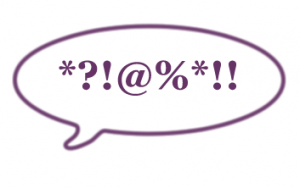New Research Reveals That Swearing Can Actually Increase Pain Tolerance

Researchers from Keele University’s School of Psychology have determined that swearing can have a ‘pain-lessening effect’, according to new study published in the journal NeuroReport.
While swearing is often a common response to pain, Dr Richard Stephens and his colleagues, John Atkins and Andrew Kingston, were surprised to discover that no links had been established between swearing and the actual experience of physical pain. Since swearing often has a ‘catastrophising’ or exaggerating effect, serving to embellish or overstate the severity of pain, Stephens and his team hypothesised that swearing would actually decrease the individual’s tolerance of pain.
The Ice Water Test
Enlisting the help of 64 undergraduate volunteers, the team set out to test their theory. Each individual was asked to submerge their hand in a tub of ice water for as long as possible while repeating a swear word of their choice; they were then asked to repeat the experiment, this time using a more commonplace word that they would use to describe a table. Despite their initial expectations, the researchers found that the volunteers were able to keep their hands submerged in the ice water for a longer period of time when repeating the swear word, establishing a link between swearing and an increase in pain tolerance.
Fight-Or-Flight Response
While it isn’t clear how or why this link exists, the team believes that the pain-lessening effect occurs because swearing triggers our natural ‘fight-or-flight’ response. They suggest that the accelerated heart rates of the volunteers repeating the swear word may indicate an increase in aggression, in a classic fight-or-flight response of ‘downplaying feebleness in favour of a more pain-tolerant machismo.’ What is clear is that swearing triggers not only an emotional response, but a physical one too, which may explain why the centuries-old practice of cursing developed and still persists today.
Dr Richard Stephens said: “Swearing has been around for centuries and is an almost universal human linguistic phenomenon. It taps into emotional brain centres and appears to arise in the right brain, whereas most language production occurs in the left cerebral hemisphere of the brain. Our research shows one potential reason why swearing developed and why it persists.”
Source: Keele university
